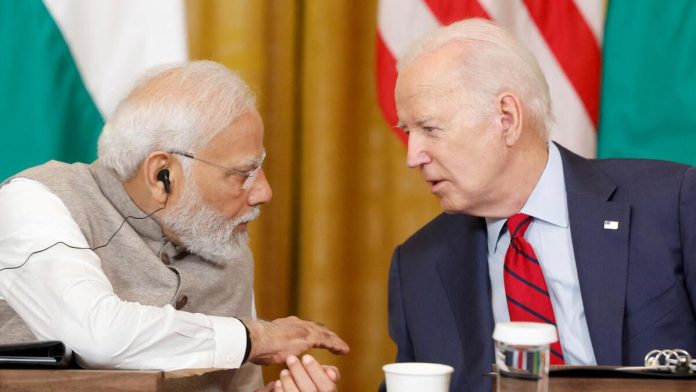WASHINGTON, Jan 15: The White House on Wednesday said that the United States “elevated” its relationship with India, kicked off the pathbreaking iCET dialogue and launched Quad during the impactful tenure of President Joe Biden.
In the Indo-Pacific, Biden’s diplomacy made America more secure by deepening its economic and security partnerships in the region, both bilaterally and multilaterally, the White House said in a fact sheet that highlighted some of the key achievements of the Biden administration.
Biden, 82, would complete his four-year term on January 20, when Donald Trump, 78, would be sworn in as the 47th president of the United States.
The fact sheet noted that during these four years, Biden reinvigorated America’s network of alliances and partnerships in the Indo-Pacific, including through the US-Japan-ROK and US-Japan-Philippines trilaterals, the Quad, AUKUS, IPEF, expanded partnership with the Philippines, and “elevated relations” with India, Indonesia, Vietnam, ASEAN, and Pacific Islands countries.
Noting that it ended the longest war in American history referring to Afghanistan, the fact sheet said Biden supported Ukraine as it bravely defended its freedom and democracy in the face of Russia’s unprovoked, illegal invasion, allowing Kyiv to defy expectations that it would fall in a matter of days.
He rallied more than 50 countries to stand with Ukraine, providing Ukraine with economic and financial support to defend its territory, and imposing costs on Russia through the strongest-ever multilateral sanctions and export controls campaign.
“The Biden-Harris administration launched the historic security partnership AUKUS with Australia and the United Kingdom; spurred unprecedented trilateral defence and economic cooperation between the United States, South Korea, and Japan; and launched a new trilateral partnership with US treaty allies Japan and the Philippines,” the fact sheet said.
“The administration also elevated other partnerships in the region including with India, Indonesia, Vietnam, ASEAN, and the Pacific Island countries.”
“President Biden deepened economic engagement with 13 Indo-Pacific partners under the Indo-Pacific Economic Framework for Prosperity (IPEF) and expanded technology innovation through the US-India initiative on Critical and Emerging Technology (iCET).”
President Biden and Prime Minister Narendra Modi announced the US-India initiative on Critical and Emerging Technology (iCET) in May 2022 to elevate and expand the strategic technology partnership and defence industrial cooperation between the governments, businesses, and academic institutions of the two countries.
“And he elevated the Quad with Australia, India, and Japan to the leader-level and hosted two historic summits with Pacific Island countries,” said the White House.
The Quad is a diplomatic partnership between Australia, India, Japan, and the United States committed to supporting an open, stable and prosperous Indo-Pacific that is inclusive and resilient.
In the Middle East, the Biden-Harris administration strengthened relations with partners across the region, and through a transformative agenda of regional integration established regional air defence networks and agreements to secure sea-to-rail linkages from India through the Gulf, Jordan, Israel and into Europe through Italy and Greece, the fact sheet said.
According to the White House, the Biden-Harris administration strengthened America’s competitive position vis-a-vis the PRC and took historic steps to deliver on the US strategy to “invest, align, and compete.”
The Biden-Harris administration made far-reaching investments in the foundation of American strength at home and deepened its ties with Indo-Pacific and European allies and partners to shape the rules of the road and address challenges to shared security, prosperity, and values, it said.
Biden took necessary action to prevent advanced US technologies from being used to undermine its national security and to address China’s unfair trade policies and non-market practices.
As he took these steps, the Administration conducted effective diplomacy with the PRC in a way that built stability into one of the world’s most consequential relationships — including concrete progress to stem the flow of fentanyl precursors and the renewal of some military-to-military communication, it said.
“Through this diplomacy, the Biden-Harris Administration responsibly managed competition to ensure that it does not veer into conflict,” said the White House. (PTI)
Trending Now
E-Paper


